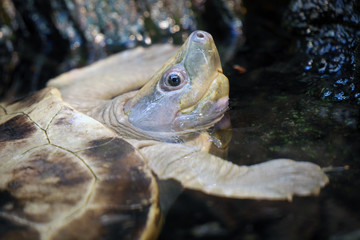ANIMAL: Malaysian Painted Terrapin/Turtle Batagur borneoensis Type of Animal: Turtle Habitat: Rivers, estuaries & mangrove swamps. Females use sandy beaches to lay eggs. Location(s): Malaysia, Borneo, Sumatra, Brunei, & peninsular Thailand Appearance: Breeding males usually have blue head w/ some red, non-breeding males have charcoal grey head, females have olive head, both sexes have flattened light-brown/grayish/blackish/olive oval carapace. Males shorter than females w/ longer, thicker tails. Projecting snout prominent. Food/Diet: Leaves, seeds, fruit Status in Wild: Critically Endangered Conservation: Breeding from zoos, aquariums, & private breeders Lifestyle: Usually found in small groups. Females will form larger groups when nesting. Additional Info: Called: Male Female Young-Hatchling Group-Bale Weight: Male-3.75 lbs Female-33-66 lbs Young-2.08-2.88 oz Gestation: 2-3 months Body Length: Male-1.3-1.8 ft Female-3.5-4 ft Young-2.76-3.96 in Life Span: 25-40 years Tail Length: Male-1 ft Female-0.5 ft Main predators of adults are monitor lizards, crocodiles, pythons, & tigers. Hatchlings preyed on by birds, large fish, & crabs. Critically endangered due to egg harvesting, poaching for meat, water pollution, climate change, pet trade, habitat loss, sand mining, & beachfront development. Only one or two river habitats have more than 100 nesting females. The World Wildlife Fund (WWF) has helped preserve the highly valuable Setiu Wetlands in Malaysia, a very important stronghold for this species. Females usually lay 10-12 eggs, sometimes up to 20 eggs, per clutch. Egg harvesting may only be carried out by licensed collectors who then sell 70% of their haul to Malayan Fisheries Department to be incubated. Unfortunately, turtle eggs are 5 times as expensive as chicken eggs thus being in high demand. Nesting season usually lasts from June-August & from October-January. Setiu River Terrapin Research and Conservation Program in Malaysia works very hard to help save these turtles. Due to egg collection, fewer & fewer females returning to nest. There is still a lot more to be learned about these rare turtles. Fun Fact(s): Hatchlings can live up to 2 weeks at sea but prefer freshwater habitats. These turtles are very docile but shy in captivity. They love to bask in the sun.
